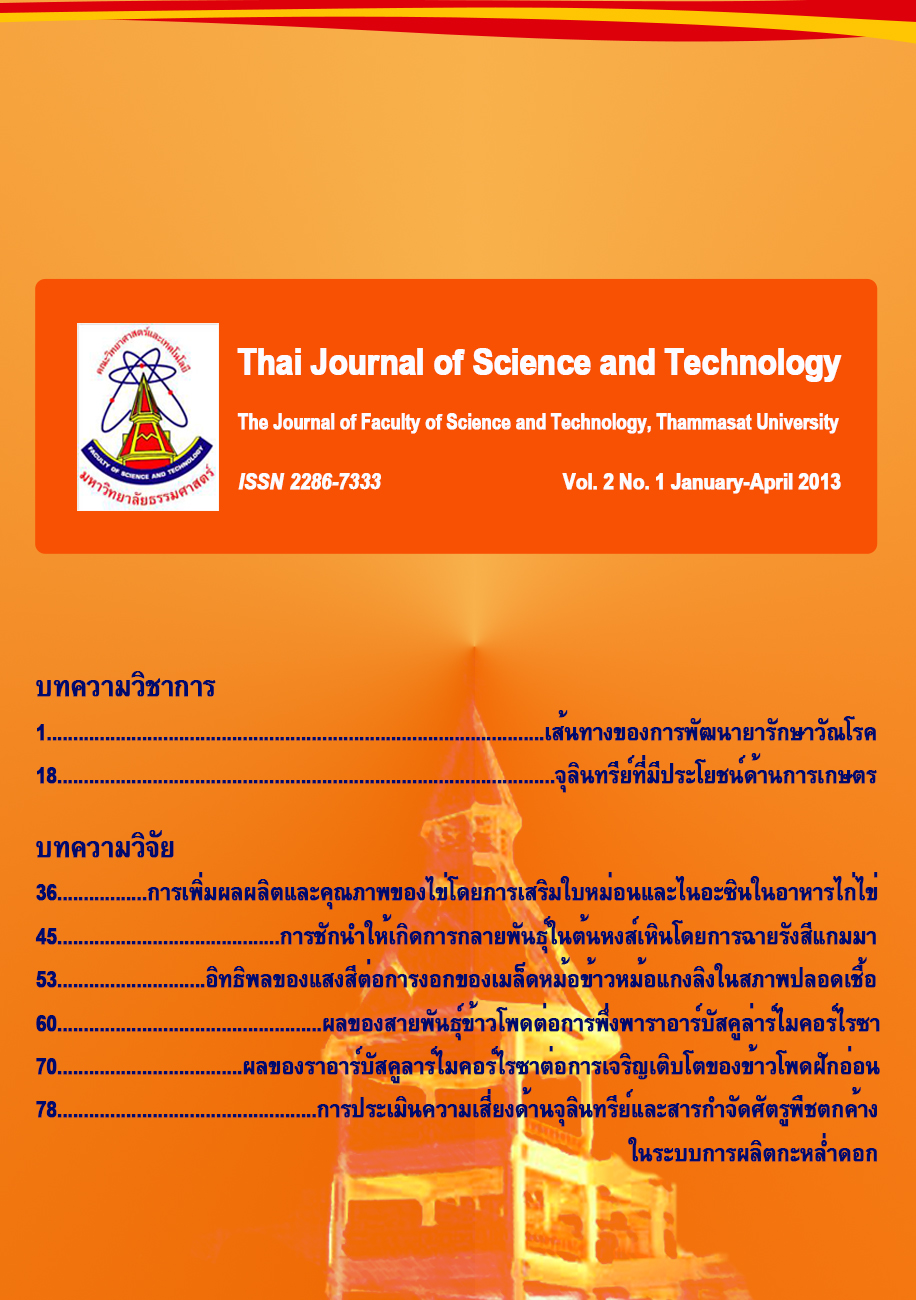จุลินทรีย์ที่มีประโยชน์ด้านการเกษตร
Main Article Content
Abstract
บทคัดย่อ
จุลินทรีย์ที่มีประโยชน์หลากหลายชนิดที่ถูกนำมาใช้เพิ่มประสิทธิภาพการผลิตพืช โดยเฉพาะอย่างยิ่งการปกป้องพืชพันธุ์อ่อนแอให้รอดพ้นจากศัตรูพืช โดยบทบาทของจุลินทรีย์เหล่านี้อาจจะช่วยพืชในการตรึงไนโตรเจน ละลายฟอสเฟต และธาตุอาหารพืชชนิดอื่น ๆ ปกป้องพืชจากการเข้าทำลายของเชื้อโรคและแมลงศัตรูพืชด้วยกลไกการเป็นปรสิตหรือตัวห้ำ การชักนำให้พืชผลิตฮอร์โมนพืช และการกระตุ้นภูมิต้านทานพืชทั้งระบบ ซึ่งจุลินทรีย์หนึ่งสายพันธุ์อาจมีหนึ่งกลไกหรือมากกว่าหนึ่งกลไกที่เป็นประโยชน์ต่อพืช ตัวอย่าง เช่น แบคทีเรียบริเวณรอบรากพืช (พีจีพีอาร์) ซึ่งมีศักยภาพในการส่งเสริมการเจริญเติบโตของพืชได้หลากหลายบทบาท ได้แก่ มีความสามารถในการผลิตสารปฏิชีวนะ การแย่งใช้ธาตุเหล็กจากเชื้อโรค ตลอดจนการชักนำให้พืชมีระบบภูมิต้านทานรอดพ้นจากการรบกวนของศัตรูพืช ซึ่งการใช้จุลินทรีย์ที่มีประโยชน์ทางการเกษตร สามารถใช้ได้หลายรูปแบบ ได้แก่ การใส่หรือราดดิน การคลุกเมล็ด หรือจุ่มส่วนขยายพันธุ์พืช รวมทั้งการพ่นต้นพืช แต่อย่างไรก็ดี การคลุกเมล็ดด้วยจุลินทรีย์เป็นวิธีที่ง่ายและประหยัด ส่วนวิธีการใส่ลงในดินต้องใช้จุลินทรีย์ในปริมาณมาก จึงทำให้สิ้นเปลืองและอาจไม่ได้ผล ถ้าเป็นวิธีการพ่นนิยมใช้ในกรณีที่ต้องการควบคุมเชื้อโรคและแมลงศัตรูพืช ซึ่งอาจทำให้พืชมีผลผลิตเพิ่มมากยิ่งขึ้น เนื่องจากจุลินทรีย์สามารถควบคุมศัตรูพืชที่ดื้อสารเคมีได้สำเร็จ แต่หลักสำคัญในการใช้จุลินทรีย์ที่มีประโยชน์คือควรมีการใช้ซ้ำในพื้นที่เดิมจนกระทั่งเชื้อโรคหรือแมลงศัตรูพืชลดลงจึงจะลดปริมาณการใช้หรือหยุดใช้จุลินทรีย์ได้ ปัจจุบันมีการพัฒนาสูตรสำเร็จหรือผลิตภัณฑ์จุลินทรีย์ที่เหมาะสมเพื่อคงประสิทธิภาพจุลินทรีย์ไม่ให้ลดลง อย่างไรก็ตาม ผลิตภัณฑ์จุลินทรีย์ที่พัฒนาขึ้นควรได้รับการทดสอบในสภาพแปลงปลูกในหลายพื้นที่ก่อนที่จะนำมาใช้ในระบบการผลิตพืชเศรษฐกิจ
คำสำคัญ : จุลินทรีย์ที่มีประโยชน์; การเกษตร
Abstract
Various kinds of beneficial microbes have been used to enhance the efficiency of plant production, especially protect susceptible crops against plant pests. The microbes may act on the plant by nitrogen fixation, phosphate and other nutrient elements solubilization, prevention of colonization of plants by pathogens, insect pests control by parasitism and predation, induction of plant growth hormones, and induce systemic resistance in host plants. Microbial agents may have one or more mechanisms of action, as in the case of plant growth-promoting rhizobacteria (PGPR) which are known to produce many antibiotics, prevent iron utilization by pathogens, and induce resistance in host plant against plant pathogens in addition to exerting a favorable effect on plant growth. Beneficial microbes may be applied in the soil, on the seed and propagating materials, and plants. Seed treatment with beneficial microbes may be the easier and economical method of application. Soil treatment with beneficial microbes requires large quantities of microbe agents and may not be cost-effective. Efforts to control foliage pathogens and insect pests by using beneficial microbes are also intensive. Spray application of beneficial microbes to protect crops has yielded encouraging results, especially when pesticide-resistant pests are prevalent. The majority of beneficial microbes require repeated applications in a location, though in a few cases a one-time inoculative release of the microbe agents may suffice. In recent years, attempts have been made to improve the performance of beneficial microbes by developing suitable formulation or products. Field evaluation of the performance of beneficial microbes under different agroecological conditions has to be taken up before large-scale use of microbe agents can be considered.
Keywords: beneficial microbes; agriculture
Article Details
บทความที่ได้รับการตีพิมพ์เป็นลิขสิทธิ์ของคณะวิทยาศาสตร์และเทคโนโลยี มหาวิทยาลัยธรรมศาสตร์ ข้อความที่ปรากฏในแต่ละเรื่องของวารสารเล่มนี้เป็นเพียงความเห็นส่วนตัวของผู้เขียน ไม่มีความเกี่ยวข้องกับคณะวิทยาศาสตร์และเทคโนโลยี หรือคณาจารย์ท่านอื่นในมหาวิทยาลัยธรรมศาสตร์ ผู้เขียนต้องยืนยันว่าความรับผิดชอบต่อทุกข้อความที่นำเสนอไว้ในบทความของตน หากมีข้อผิดพลาดหรือความไม่ถูกต้องใด ๆ


